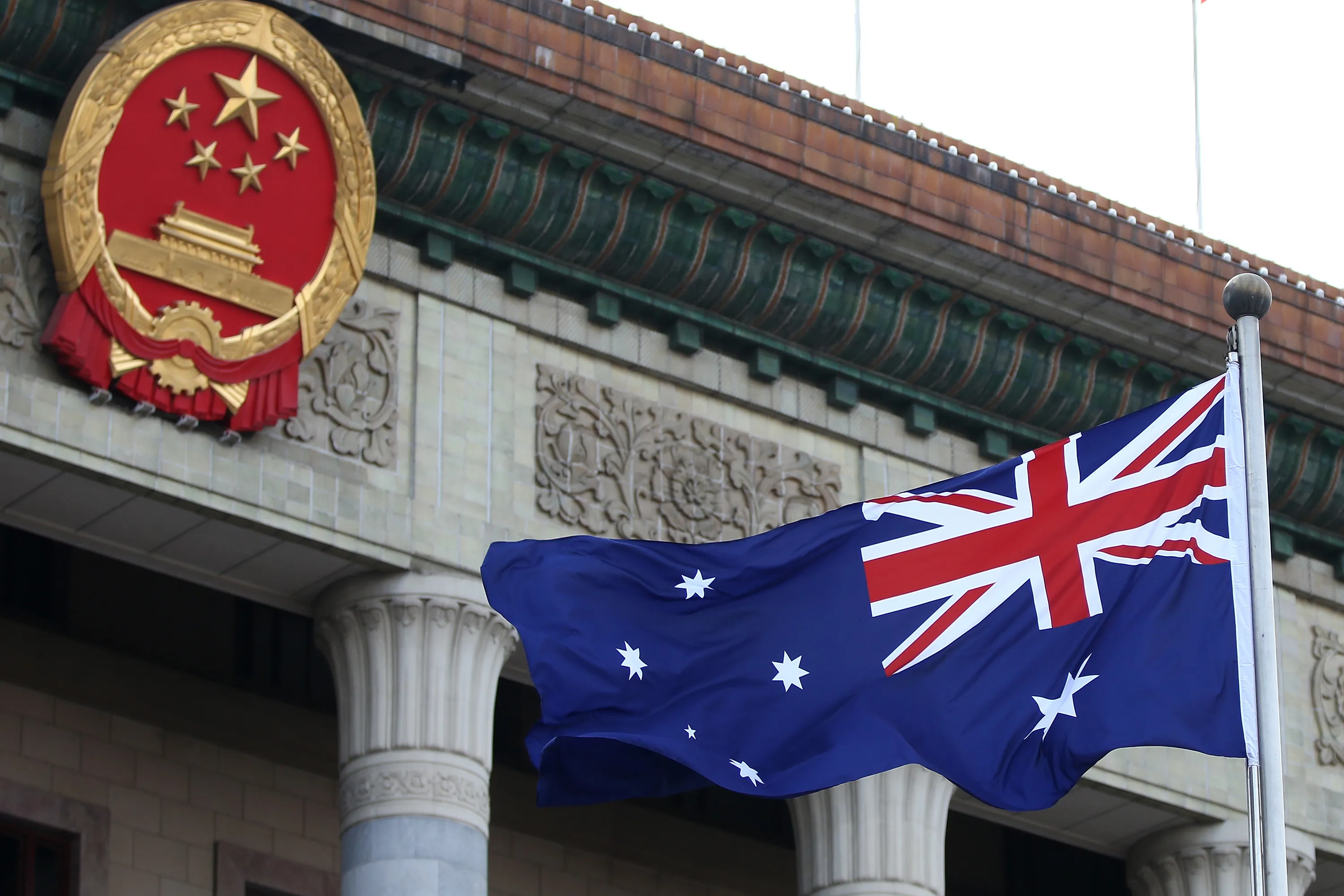 This is the 78th article in the series
This is the 78th article in the series The China Chronicles.
Read all the articles here.
Managing relations with China is one of the most fraught challenges Australia is facing in the foreign policy realm. Given China’s economic rise and thereby its growing influence in the global stage, maintaining healthy relations with China is policy priority for Australia. China is by far Australia’s largest trading partner, with two-way trade reaching the target of 180 billion Australian dollars a year. Additionally, around 1.2 million Australians have Chinese heritage. However, politically the relationship has had its peaks and troughs. In recent years, concerns have arisen over Chinese investments in Australia, Beijing’s establishment of an Air Defence Identification Zone (ADIZ) in the East China Sea, and the arrest of ethnically Chinese Australian citizens in China, among others. As Rory Medcalf points out, “there has been seemingly dramatic change of direction in the past two years, towards a relationship with China based more on security and sovereignty, balancing economic opportunity with heightened awareness of risk.”
In recent years, concerns have arisen over Chinese investments in Australia, Beijing’s establishment of an Air Defence Identification Zone (ADIZ) in the East China Sea, and the arrest of ethnically Chinese Australian citizens in China, among others.
The most striking aspect of Australia’s ‘China Debate’ today revolves around the issue of political donations with claims that China is seeking to undermine Australian democracy and shift policy positions in Canberra in ways which are favourable to Beijing. Australian media reports from the year 2017 have highlighted how the Chinese Communist Party (CCP) is systematically silencing critics in Australia and co-opting Chinese-language media to present favourable views. In 2015, the Australian Security Intelligence Organisation (ASIO) had issued a warning to the two major political parties in Australia that two of Australia’s most well-known donors had “strong connections to the CCP”. In December 2017, another report in the Australian had identified candidates in the state and local government elections who they regarded as having close ties with Chinese intelligence services. This is believed to be a deliberate strategy by Beijing to wield influence through Australian domestic political system. A well-known case was of Sam Dastyari, a famous Labor Party Senator who was forced to retire after the Fairfex Media reported that he had reiterated Beijing’s stand on the South China Sea issue while standing alongside a Chinese citizen donor. In recent years, the CCP’s efforts at influencing and interfering in Australia have become increasingly bold with an overt agenda to influence Chinese communities in Australia. The recently announced consolidation of Chinese state media outlets under the Propaganda Department and the expansion of the United Front Work Department’s mandate for overseas Chinese suggest that the CCP’s activities in Australia are likely to continue and potentially intensify.
While some in Australia have been appreciative of the media and other agencies for bringing out the harmful impacts of Chinese donations as it is important for securing national interests, some have even been critical by pointing out that these accusations should be backed by proper facts. In a piece in the Asia Dialogue it was pointed out that contrary to the assertion that there has been a persistent increase in Chinese donations, data from 2015 and 2016 show that “Chinese donations were in line with the annual average over the past decade, less than half that recorded in 2008, and less than one-fifth that in 2014.” Australian citizens with significant business interests in China made these donations. These facts are not included in the reports of the media agencies. Furthermore, it was observed that there has been an increase in foreign donations in general and not just from Chinese sources. In the last seven federal election cycles, foreign donations in general have ranged between 0.03 per cent of total donations and 6.13 per cent.
Domestically, there needs to be sustained reassurance and outreach to Chinese Australian communities, that the hardline measures are not targeted at them.
Some have even linked this issue to having a racially discriminatory undertone. Joo-Cheong Tham, an academic at the University of Melbourne who specialises in the study of money in Australian politics, remarked: “why is ancestry or country of birth presumed to be significant among “Chinese” political donors but not among others?” This is also a challenge, which Australia is facing as to how to maintain its image as a multicultural country, while being cautious and watchful of the growing Chinese influence, especially the influence of the CCP. Domestically, there needs to be sustained reassurance and outreach to Chinese Australian communities, that the hardline measures are not targeted at them.
In March 2018, a group of scholars from China and the Chinese diaspora submitted an open letter to Australia’s parliamentary review of new national security legislation. In this letter, it was highlighted that “an open debate on the activities of the CCP in this country is essential to intellectual freedom, democratic rights and national security. This debate is valuable and necessary.”
These debates around the ‘China factor’ in Australian politics raise two issues, which Canberra will have to contend. First, what impact will ‘Chinese donations’ and the debates surrounding it have on the upcoming elections on 18 May 2019? Secondly, how will Australia manage its relations with China?
The debates around the ‘China factor’ in Australian politics raise two issues, which Canberra will have to contend.
Australia is vulnerable to covert influence from China in part because of its large Chinese diaspora (between four and five percent of the population), whose loyalty the CCP works hard to gain and keep. Australia’s economic dependence on China has also created an influential group of Australian business executives, politicians, academics, and commentators who are sympathetic to Chinese interests.
The former Malcolm Turnbull government had on 28 June 2018 enacted a new foreign influence transparency scheme that would require anyone acting on behalf of a foreign principal (a state, state-owned corporation, or company believed to have links to a government) to register publicly. In addition to broadening the definition of espionage, the new foreign interference legislation bans less direct forms of influence. It prohibits conduct that is directed, funded, or supervised by a foreign principal (or someone acting on its behalf) and is intended to influence a political or governmental process or the exercise of a democratic or political right or to prejudice national security and is covert or involves deception or threats. This scheme had managed to get the support of the opposition Labor Party as well. The new transparency scheme is expected to ensure the Australian public has greater insight into the activities of those attempting to influence domestic policy and debate on behalf of a foreign power. The impact of this law on the upcoming elections remains uncertain. The problem as Rory Medcalf has pointed out “Australian political parties have become dependent on foreign funding. There has been a persistent increase in Chinese donations to Australian political parties since 2006–07, spiking in each Federal election from 2007 to 2016.” However, greater transparency in foreign donations is certainly desirable in mature democracies.
For China, Australia is also a longtime ally of the US and the championing of the Indo-Pacific concept by Australia, which China perceives, is a strategy to contain its rise is further challenging China-Australia ties.
These laws have been passed at a time when Australia is especially anxious about the growth of Chinese power. They could further complicate Australia’s relationship with Beijing, which has “treated the laws as an insult. The Chinese government has responded coolly, canceling visas for Australian business leaders and suggesting that the country’s politicians are motivated by xenophobia and racism.” For China, Australia is also a longtime ally of the US and the championing of the Indo-Pacific concept by Australia, which China perceives, is a strategy to contain its rise is further challenging China-Australia ties. Nevertheless, the stand towards China is unlikely to change even if there is a change in government post polls. The Labour government has not only lent its support to the foreign interference and espionage law. Also according to an opinion piece in the Financial Review, the Labor Party views the Quadrilateral (Australia, India, US and Japan) as “a space for four like-minded trading democracies to share their thoughts on regional security. Defence relations, naval exercises with these countries and others in the region also play a critical role in building operational understanding and confidence which in turn is vital for the security of the Indo-Pacific.”
While dealing with China, Australian policymakers will have to be cognisant of two contradictory factors. First is what former Prime Minister, Turnbull had stated in 2017, “Australia’s relationship with China is far too important to put at risk by failing to clearly set the terms of healthy and sustainable engagement”. The second is as scholars have noted, being a traditional ally of the US, and with Australia strengthening its ties with other Indo-Pacific countries like Japan, India, Indonesia, there is an imperative for Australia to maintain a balance or to focus on rebalancing given the economic importance of China to Australia.
The views expressed above belong to the author(s). ORF research and analyses now available on Telegram! Click here to access our curated content — blogs, longforms and interviews.



 This is the 78th article in the series The China Chronicles.
Read all the articles
This is the 78th article in the series The China Chronicles.
Read all the articles  PREV
PREV


